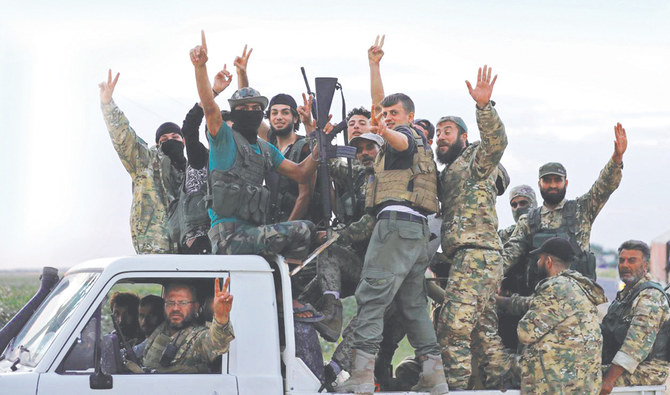ANKARA: The surprise cease-fire deal between US Vice President Mike Pence and Turkish President Recep Tayyip Erdogan in Ankara has brought a new dimension to the dynamics in northern Syria. Turkey launched the cross-border offensive last week after US President Donald Trump announced he was pulling US forces out of the Syria-Turkey border region.
Ankara’s goal is to push back a Kurdish militia group — the People’s Protection Units (YPG) — that it sees as a terrorist organization. The Syrian Democratic Forces (SDF) — a group dominated by the YPG — fought with the US against Daesh in Syria.
On Thursday evening Turkey agreed to a 120-hour pause in military operations against the YPG militia for the next five days to give Kurdish troops time to withdraw from a proposed “safe zone” along its border.
Ankara has agreed to a permanent cease-fire once the withdrawal is complete, Pence told reporters in Ankara after his meeting with Turkish officials.
In return, the US will not impose further sanctions on Turkey and remove the ones imposed last week, although there is still a risk that a bipartisan group of US senators will press ahead with new sanctions.
Erdogan is due to meet President Vladimir Putin in Russia on Tuesday, where further talks are expected about Turkey’s safe zone plans.
“I consider my meeting with President Putin as another element of this (safe zone) process,” Erdogan said Friday. “Turkey wouldn’t be bothered by Assad regime control in towns like Manbij, Kobani and Qamishli if the YPG is completely cleared out.” The question remains whether the cease-fire will hold.
In comments to local television on Thursday night, the SDF’s Gen. Mazloum Kobani said the deal only applied to the area between the towns of Tal Abyad and Ras Al-Ain.
Erdogan announced on Friday that if the conditions in the agreement were not met during the 120 hour-pause, Turkey would relaunch Operation Peace Spring “in a more decisive manner.”
Selim Sazak, a doctoral researcher at Brown University and the research director of Ankara-based consulting firm TUM Strategy, believed the agreement would be implemented and the YPG would withdraw.
FASTFACT
Erdogan is due to meet President Vladimir Putin in Russia on Tuesday, where further talks are expected about Turkey’s safe zone plans.
“The agency of the YPG is fairly limited. If the deal collapses because of the YPG, it’s actually all the better for Ankara,” he told Arab News.
“What Ankara originally wanted was to take all of the belt into its control and eliminate as many of the YPG forces as possible. Instead, the YPG is withdrawing with a portion of its forces and its territory intact. Had the deal collapsed because of the YPG, Ankara would have reason to push forward, this time with much more legitimacy.”
Tal Abyad and Ras Al-Ain were the easiest link in the second phase of Turkey’s Syrian operation and with the same tactic, he added.
“On the west of the Euphrates, Ankara began by drawing a wedge in the YPG-controlled territory via the Arab-dominant Jarablus and Al-Bab and then opened the wedge toward Afrin on the east and Manbij on the west. The same is happening here. Drive a wedge through Ras Al-Ain and Tal Abyad, open it up toward Kobani on the west and Qamishli on the east.”
Ultimate goal
Sazak said he believed that Ankara was sincere about not having territorial ambitions.
“Its ultimate goal is for the YPG to be pushed away from the border. If that’s the case, it doesn’t matter who controls Kobani or Manbij so long as it’s not the YPG. In the short run, it gives Ankara more time, but in the long run it is probably not an ideal position.”
Dareen Khalifa, a senior Syria analyst at the International Crisis Group, said the cease-fire had unclear goals.
There was no mention of the scope of the area that would be under Turkish control and, despite Pence referring to a 32-km zone in his speech, the length of the zone remains ambiguous, she said.
“It’s unclear if the US only agreed to what (the US special representative on Syria) James Jeffrey and Mazloum described — the 110-km area currently under Turkish control — or to YPG withdrawal from the entire zone, which is over 400 km along the Turkish border,” she told Arab News.
“If it is the former and the YPG is expected only to leave the area where Turkey is already at, then the agreement might stall over divergent interpretations from both sides. I don’t expect Turkey to settle for less when they could push for more.”
Khalifa said if it was the latter and the US agreed to a full YPG withdrawal from a 30-km area along the entire 400-km border strip then the US, in search for a face-saving deal, has decided to capitulate to Turkish demands and claim it is a deal reached through negotiations.



























